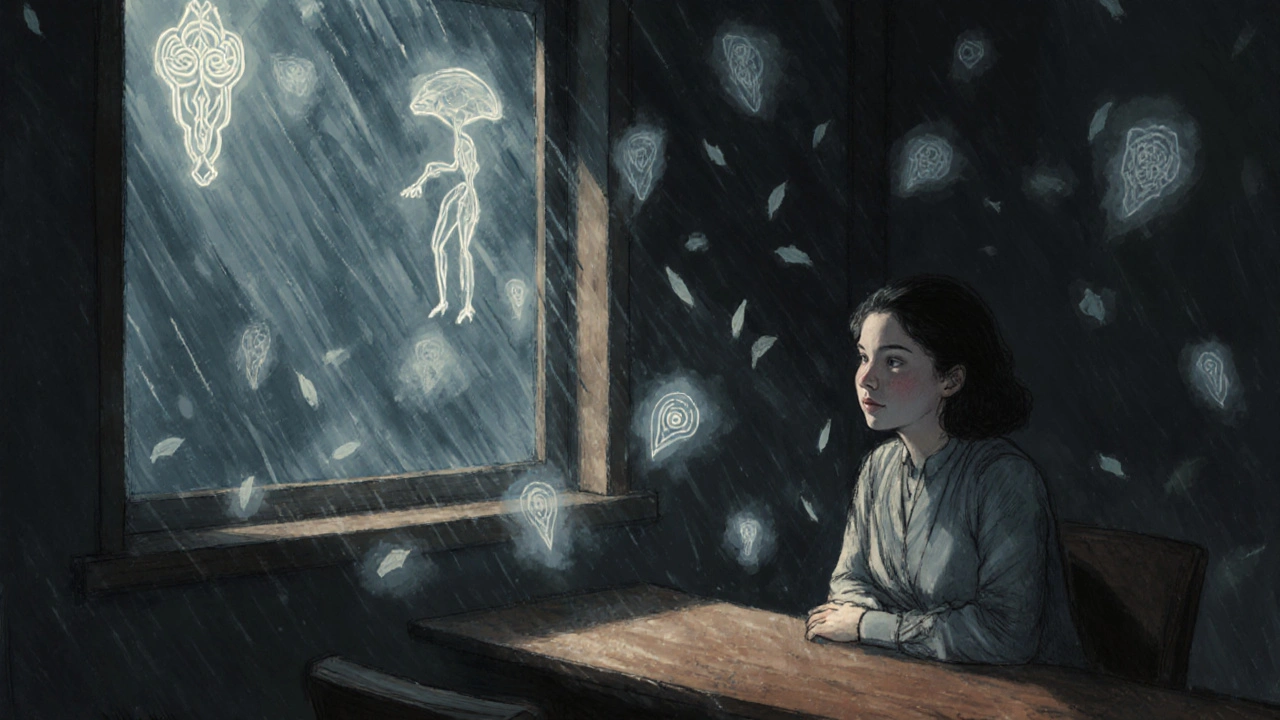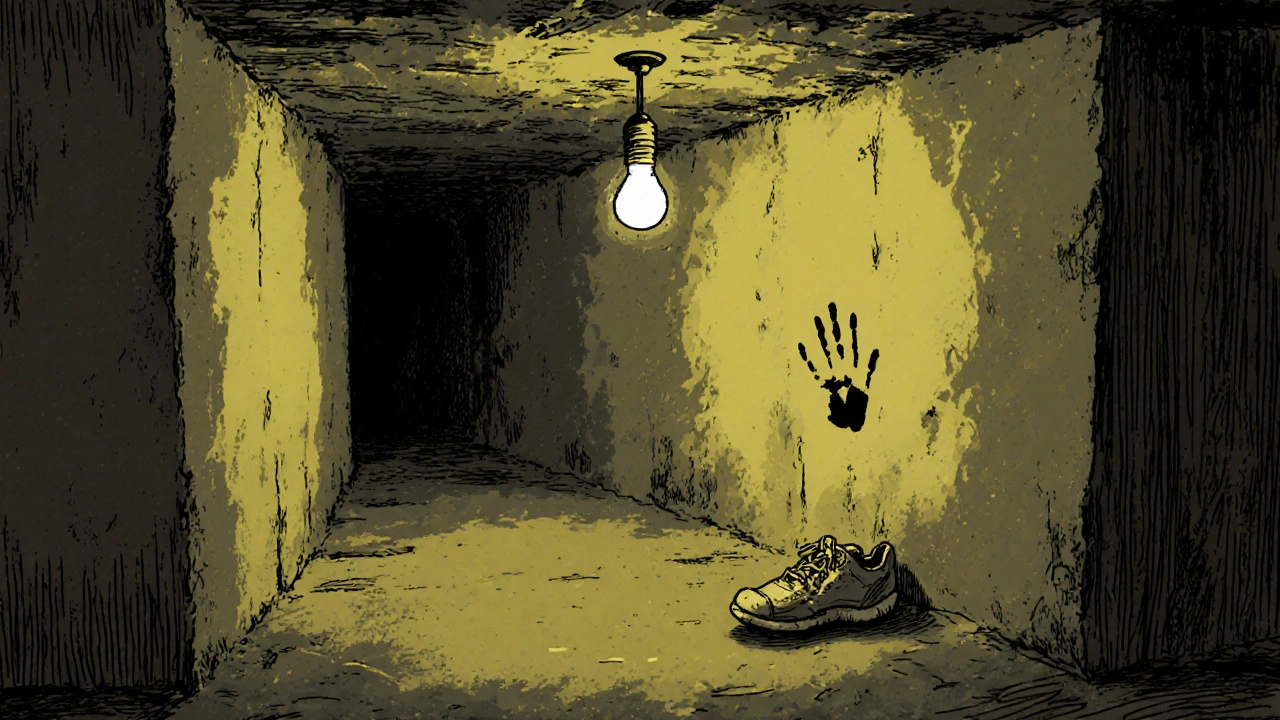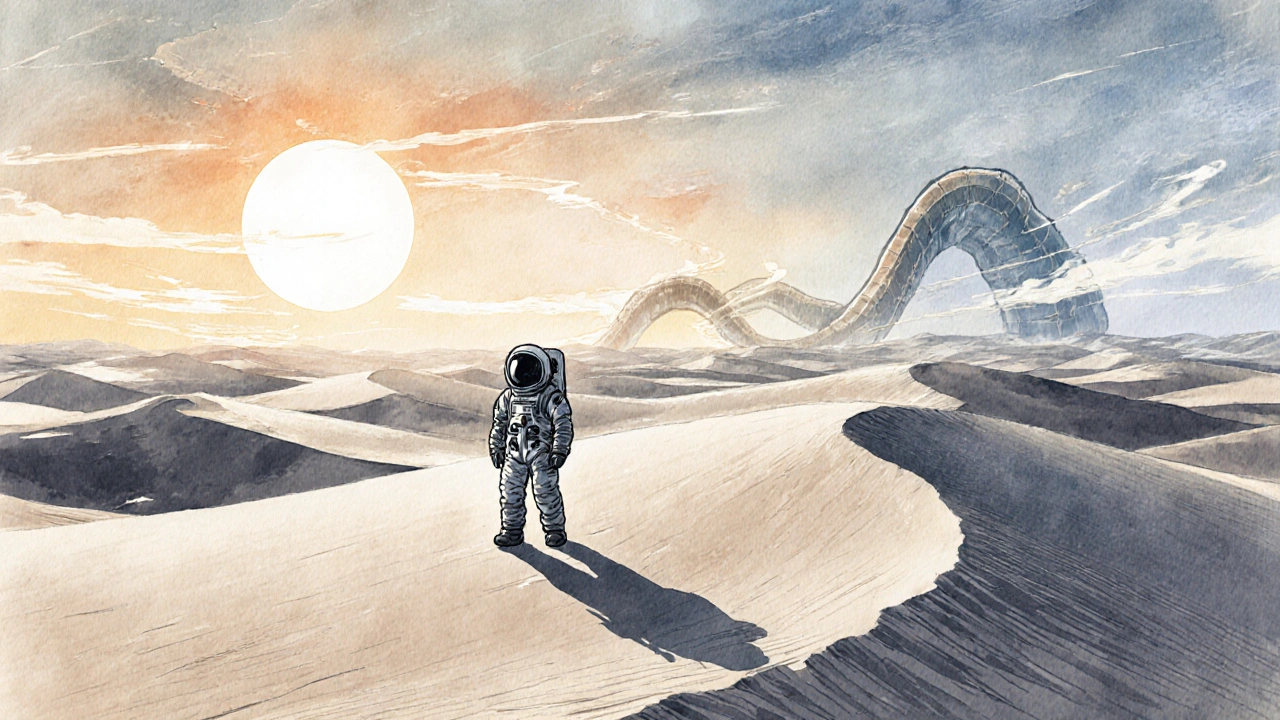Denis Villeneuve doesn’t make movies. He builds worlds that breathe, ache, and whisper. You don’t just watch his films-you feel them in your bones. From the crushing silence of a desert planet to the flickering glow of a neon-lit alley in a future that feels too close, his work balances grandeur with quiet humanity. It’s rare for a director to make sci-fi epics that feel like personal diaries, but Villeneuve does it without effort. He’s the filmmaker who can show you a spaceship the size of a city and still make you cry over a single tear on a character’s cheek.
The Weight of Silence
Villeneuve’s films don’t rely on loud music or fast cuts to build tension. He lets silence do the work. In Arrival, the alien language isn’t just a plot device-it’s a meditation on time, loss, and choice. The scenes where Louise Banks (Amy Adams) listens to the heptapods speak are filled with long pauses, empty hallways, and the sound of breath. No orchestral swell. No jump scare. Just the quiet hum of something vast and unknowable. That silence isn’t empty. It’s full of meaning.
Compare that to Dune. The sandworms rise with a rumble that shakes theater seats. The Harkonnen ships blot out the sun. But when Paul Atreides stands alone on the dunes, staring at the horizon, the camera holds. No music. Just wind. You feel his fear, his doubt, his loneliness. That’s Villeneuve’s trick: the bigger the spectacle, the more he pulls you inward.
Architecture of Emotion
Villeneuve doesn’t just direct actors-he designs spaces for them to live in. His sets aren’t backdrops. They’re emotional landscapes. In Blade Runner 2049, the city isn’t just neon and rain. It’s a monument to isolation. The towering holograms of virtual idols don’t bring people together-they remind them how alone they are. The color palette? Muted grays, sickly yellows, cold blues. Even the light feels heavy.
He uses architecture to mirror inner states. In Prisoners, the claustrophobic basement where the missing girls are held isn’t just a location-it’s the physical manifestation of grief. The walls press in. The air is thick with dust and despair. You don’t need dialogue to understand how trapped the characters are. The room tells you everything.
Science Fiction as Human Storytelling
Most sci-fi directors use aliens, robots, or space travel as excuses for action. Villeneuve uses them to ask questions about what it means to be human. In Arrival, the aliens don’t come to conquer. They come to share. And the real threat isn’t war-it’s misunderstanding. The film’s climax isn’t a battle. It’s a mother choosing to love, knowing it will lead to heartbreak.
Even in Dune, the epic battle for control of Arrakis isn’t about power. It’s about identity. Paul doesn’t want to be a messiah. He fears becoming one. The prophecy isn’t destiny-it’s a cage. Villeneuve turns a mythic tale into a psychological portrait of a boy drowning in expectation.
He doesn’t need space lasers to make you feel something. He needs a look. A pause. A hand reaching out in the dark.

The Influence of Canadian Realism
Villeneuve didn’t grow up in Hollywood. He grew up in Quebec, where cinema was about people, not explosions. His early films-Incendies, Polytechnique, Enemy-are brutal, quiet, and deeply human. Incendies follows twin siblings uncovering their mother’s secret past. It’s a war story, but it’s not about soldiers. It’s about a mother’s love, the cost of silence, and how trauma echoes across generations.
That Canadian realism still lives in his blockbusters. Even when he’s filming in Jordan or Iceland, the emotional core is rooted in the same truth: people are messy, complicated, and rarely heroic in the way movies usually show. His characters don’t monologue about their motives. They sit in silence. They make mistakes. They break down in the middle of a war zone and don’t get up right away.
Collaborations That Shape His Vision
Villeneuve doesn’t work alone. He builds teams that think like him. His longtime cinematographer, Roger Deakins, doesn’t just light scenes-he sculpts mood. The way light falls on a sand dune in Dune isn’t accidental. It’s calculated to make the desert feel alive, ancient, and indifferent. Deakins once said Villeneuve would sit for hours watching how shadows moved across a wall before saying “shoot.”
His composer, Hans Zimmer, doesn’t write scores-he builds sonic textures. In Dune, the music isn’t orchestral. It’s primal. Deep drums, distorted chants, the sound of wind through stone. It doesn’t tell you how to feel. It makes you feel it without knowing why.
Even his editors, Joe Walker and Sylvain Bellemare, understand silence. They cut long. They hold. They let the audience sit with discomfort. In Prisoners, there’s a 90-second take of Hugh Jackman staring at a wall. No music. No dialogue. Just breath. That’s Villeneuve’s rhythm.

Why His Style Works Now
In a world of algorithms pushing 30-second clips and endless noise, Villeneuve’s films feel like an act of rebellion. People are tired of being shouted at. They’re hungry for depth. His movies demand attention-not because they’re confusing, but because they’re honest. They don’t explain everything. They don’t tie everything up neatly. They leave space for you to sit with your thoughts.
That’s why audiences return to his films. Not for the explosions. Not for the CGI. But for the quiet moments after. The way a character looks out a window. The way a child’s hand brushes against a parent’s. The way silence becomes a character itself.
What Comes Next
He’s already working on Dune: Messiah, and rumors suggest a sequel to Arrival. But whatever he makes next, it won’t be about scale for scale’s sake. It will be about what happens when humans face something beyond their understanding-and still choose to love, to connect, to remember.
Villeneuve’s greatest trick isn’t his vision. It’s his patience. He lets his stories unfold like a slow tide. You don’t notice the water rising until you’re already in it.
What makes Denis Villeneuve’s films different from other sci-fi directors?
Villeneuve’s films prioritize emotional truth over spectacle. While other directors use aliens or futuristic tech as action backdrops, he uses them to explore grief, identity, and human connection. His scenes often rely on silence, long takes, and subtle performances rather than explosions or fast editing. Even in massive films like Dune, the focus stays on internal struggle-not external conflict.
Is Denis Villeneuve considered an auteur?
Yes. He has a consistent visual style, recurring themes (isolation, memory, loss), and a tight-knit crew he works with across projects. His films are unmistakably his own-whether it’s the use of desaturated color palettes, deliberate pacing, or the blending of intimate character moments with epic settings. He controls nearly every creative element, from script to final cut, which is the hallmark of an auteur.
Which of Villeneuve’s films should I watch first?
Start with Arrival. It’s the most accessible entry point-visually stunning, emotionally powerful, and under 2 hours. It shows his signature blend of intellectual depth and human emotion without requiring prior knowledge of sci-fi tropes. If you prefer darker, more psychological stories, begin with Prisoners. For pure scale, go with Dune, but be ready for a slow burn.
Why does Villeneuve use so much silence in his films?
Silence forces the audience to pay attention. It removes distractions and lets emotions breathe. In Arrival, silence represents the unknown. In Dune, it reflects the vastness of the desert and the weight of destiny. Villeneuve trusts viewers to sit with discomfort and draw their own meaning. It’s not empty-it’s intentional.
Does Villeneuve’s Quebec background influence his directing style?
Absolutely. His early Canadian films like Incendies and Polytechnique are grounded in realism, emotional restraint, and moral ambiguity. He learned to tell stories through subtle gestures and prolonged silence-not dramatic monologues. That approach carries into his Hollywood work. Even in space operas, his characters feel real because they react like real people: quietly, imperfectly, and often without words.
His films don’t ask you to cheer. They ask you to remember. To feel. To wonder. And that’s why, in a noisy world, Denis Villeneuve’s voice is the one you can’t ignore.

